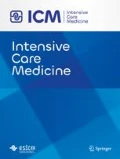Dear Editor,
Intensive care physicians frequently make difficult decisions about patient admission to the intensive care unit (ICU). Outcomes for ICU patients have improved, but a significant proportion of patients admitted to the ICU do not survive, die within a short period of leaving hospital, or never return to their prior level of functioning [1]. This creates a tension between what can be done (types and intensity of treatments) and that which should be done.
We examined ICU nurses’ and doctors’ opinions regarding the appropriateness of admission for patients fitting the prioritization framework by the Society of Critical Care Medicine: patients judged to be “too well” or “too sick to benefit” from ICU admission [2]. We also assessed whether ICU staff believed that these patients would be admitted to their ICU.
Methods
This study was approved by the institutional review boards at all participating institutions. We surveyed physicians and nurses working at adult ICUs in California, taken from a stratified random sample of hospitals in 2013 [3]. Staff indicated on a 0–10 scale how strongly they agreed with admitting patients described by four vignettes: (1) a patient who required monitoring only and was not expected to deteriorate; (2) a patient with advanced dementia and new onset septic shock requiring intubation and vasopressors without an easily reversible cause; (3) a patient with advanced cardiac (NYHA class IV) or respiratory (oxygen-dependent) failure not amenable to transplant and a deterioration in their cardiorespiratory function; (4) and a patient with metastatic cancer who is deteriorating rapidly without curative option for their cancer and an expected survival of less than 6 months. Respondents were directed that “the patient did not have an advanced directive or surrogate available to guide their actions”.
Results
The responses from 1304 ICU staff (203 doctors, 1101 nurses) are displayed in Fig. 1. In all four vignettes, there was a significant disconnect between the perception that the patient “should” be admitted, and “would” be admitted to the ICU (p = 0.0000).
Answers were given on a scale from 0 strongly disagree to 10 strongly agree. For this analysis, strongly agree equals answering 9 or 10. Weighted results were calculated using analysis weights derived from the sampling stratification and the probability of providers responding (total staff numbers/number of responses)
Discussion
Patients that fall into the categories “too well” or “too sick to benefit” from ICU care are frequently admitted to US ICUs [4]. Our findings suggest that for patients with life-limiting and irreversible co-morbidities, most staff believe that these patients should not be admitted to the ICU upon deterioration. The reasons for admission may include (1) ICU staff are responding to (perceived) patient or family requests to continue care that is inappropriate, (2) lack of clear patient wishes, (3) divided responsibility for treatment decisions between the primary care and ICU team [3].
If there is a discrepancy between what ICU staff feel are appropriate treatments to be provided to patients and what is actually happening, then we need to test solutions to this problem [5]. Potential strategies may include (1) early identification and discussion with patients “too sick to benefit” from aggressive ICU treatments; (2) increasing advance directive use in high risk patient groups; and (3) measuring the outcomes of these patients (some may do better than expected). Future research should also test these results in other locations.
References
Yende S, Austin S, Rhodes A et al (2016) Long-term quality of life among survivors of severe sepsis: analyses of two international trials. Crit Care Med 44:1461–1467. https://doi.org/10.1097/CCM.0000000000001658
Egol A (1999) Guidelines for intensive care unit admission, discharge, and triage. Crit Care Med 27:633–638. https://doi.org/10.1097/00003246-199903000-00048
Anstey MH, Adams JL, McGlynn EA (2015) Perceptions of the appropriateness of care in California adult intensive care units. Crit Care 19:51
Chang DW, Dacosta D, Shapiro MF (2017) Priority levels in medical intensive care at an academic public hospital. JAMA Intern Med 177:280–281. https://doi.org/10.1001/jamainternmed.2016.8060
Ubel PA, Angott AM, Zikmund-Fisher BJ (2011) Physicians recommend different treatments for patients than they would choose for themselves. Arch Intern Med. https://doi.org/10.1001/archinternmed.2011.91
Acknowledgements
Dr. Anstey was supported by a Harkness Fellowship from The Commonwealth Fund (2012–13). The views presented here are those of the authors and should not be attributed to The Commonwealth Fund or its directors, officers, or staff. This project was also supported by a grant from the California Health Care Foundation. The supporting funders had no involvement in the design and conduct of the study; collection, management, analysis, and interpretation of the data; and preparation, review, or approval of the manuscript. Dr. Anstey had full access to all the data in the study and takes responsibility for the integrity of the data and the accuracy of the data analysis.
Author information
Authors and Affiliations
Corresponding author
Ethics declarations
Conflicts of interest
The authors declare that they have no competing interests.
Rights and permissions
About this article
Cite this article
Anstey, M.H., Adams, J.L. & McGlynn, E.A. Is there a disconnect between what we do and what we should do? A survey of intensive care physicians and nurses in California. Intensive Care Med 44, 1180–1181 (2018). https://doi.org/10.1007/s00134-018-5114-z
Accepted:
Published:
Issue Date:
DOI: https://doi.org/10.1007/s00134-018-5114-z


